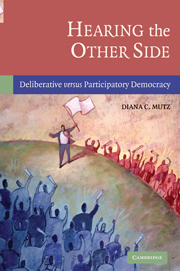3 - Benefits of Hearing the Other Side
Published online by Cambridge University Press: 05 June 2012
Summary
Theorists extol the virtues of political talk, foundations spend millions of dollars to encourage people of opposing views to talk to one another, and civic journalism advocates plan special meetings to foster more political conversations across lines of difference. Yet what do we really know about beneficial outcomes of political talk as it occurs in day to day life? More to the point, do we have convincing evidence that hearing the other side improves individuals or societies in some tangible way?
For the most part, arguments for the centrality of political discussion among ordinary Americans have been highly theoretical in nature. This is true in two senses. Not only are these expectations derived from various brands of political theory as outlined in Chapter 1, but with few exceptions they remain entirely hypothetical expectations. The same is true with respect to the benefits of hearing the other side, a subset of the many claims about the benefits of political talk.
As deliberation and deliberative democracy have become buzzwords for what democracy needs, scholars have become increasingly interested in documenting and harnessing this supposedly beneficial force. A spate of recent studies has attempted to manipulate deliberation by bringing people together to talk in small groups. These studies have provided many new insights on what happens when people are compelled to talk to one another about controversial issues, but the broad and variable nature of their interactions has made it difficult to determine which aspects of the experience are producing the observed effects.
- Type
- Chapter
- Information
- Hearing the Other SideDeliberative versus Participatory Democracy, pp. 57 - 88Publisher: Cambridge University PressPrint publication year: 2006
- 1
- Cited by



